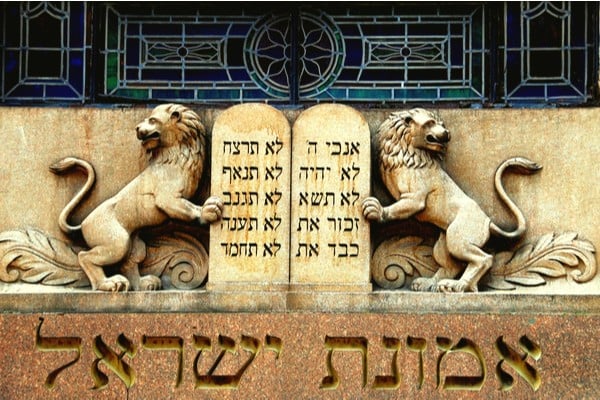What’s the difference between the 10 Commandments given at Sinai and the Seven Noahide Laws?
By Rabbi Ari Enkin, Rabbinic Director, United with Israel
This week’s Torah portion is “Yitro” (Exodus 18:1-20:23) and in it we read about the Revelation at Sinai and the Ten Commandments…so let’s talk all about it!
The Ten Commandments, originally given to the Jews only, have been adopted by nearly every race and religion as a universal and timeless standard of right and wrong. While we Jews have no problem with that, we do believe that all the commandments of the Torah were only given to the Jewish people to observe. We believe that Non-Jews should observe what is known as the “Seven Commandments” given to Adam and Noah that are to be observed by all mankind.
That being said, there is some overlap between the Seven commandments and the Ten commandments.
Jewish tradition considers the Ten Commandments as the “spiritual father” of all the other commandments of the Torah. Although the movie portrayed the tablets of the Ten Commandments with rounded tops, rabbinic consensus is that they were square. Each tablet contained five commandments (the movie got that one right!) though there is an opinion that each tablet contained all Ten Commandments!
Another cool factoid about the tablets of the Ten Commandments is that the commandments (according to the Talmud) were carved through the full thickness of the tablets, yet were miraculously legible from both sides.
During the Temple era, the Ten Commandments were recited daily as part of the morning service. Eventually, however, this practice was abolished because troublemakers started to preach and claim that only the Ten Commandments were important, but that the other 603 were not. Some people have the commendable custom to recite the Ten Commandments each day, but this should only be as a private practice and not a public one.
The Ten Commandments are read as part of the Torah reading service three times a year, twice as part of the annual reading (the Ten Commandments appear in this week’s Torah portion and in a Torah portion in Deuteronomy) and on the holiday of Shavuot, the holiday on which the Ten Commandments were actually given.
There are two ways to chant the Ten Commandments when reading them. One chant turns the Ten Commandments into ten verses. As such, commandments that take up more than one verse, such as the commandment to observe the Sabbath, is chanted as if it were a one long verse. This is the way it is read from the Torah in the synagogue. The other chant, where each verse remains a single verse, is used in private study.
As alluded to above, there is an idea that the Ten Commandments contain all the rest of the Torah’s commandments. For example, we are taught that the 620 letters of the Ten Commandments (From Exodus 20:2-14. Count them yourself!) represent the 613 commandments plus the seven days of Creation. So too, the numerical value (gematria) of the word “Torah” is 611. We are told that God only said the first two commandments with the rest being said by Moses. As such 611 + 2 = 613.
The tzitzit are especially connected to the 613 commandments. It goes like this: the word tzitzit has the numerical value of 600. Each tassel has eight threads and five sets of knots, totaling 13. 600+13 = 613! Indeed, we are to consciously remember the 613 commandments of the Torah when wearing a tallit.
The idea that there are 613 commandments in the Torah , 365 “negative” commandments and 248 “positive” commandments, is more of a tradition than a literal count. Indeed, there were authorities who came up with different counts throughout the ages.
By connecting the Ten Commandments to all the other commandments in the Torah there is more meaning to the Revelation at Sinai. Many of the mitzvot cannot be observed nowadays as many are dependent on the existence of a functioning Temple. Some can only be observed in the land of Israel, some can only be observed by men, and some only by women, among other divisions and categories.
For more insights by Rabbi Enkin on this week’s Torah portion, click on the links below.
The Noahide Laws Are for Everyone
Revelation at Sinai: Defining Our Relationship with God
What is the Single Most Important Accomplishment in Life?
